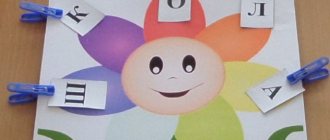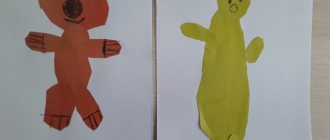Didactic manual on the lexical topic “Vegetable garden”
Marina Kryukova
Didactic manual on the lexical topic “Vegetable garden”
Didactic game " Vegetable garden "
Simply print the material on thick paper and cut it into cards.
1. Educational: To consolidate knowledge about fruits and vegetables, develops cognitive interest in the world around us, develops attention, memory and vocabulary of children.
2.Developing: Develop word formation skills, practice selecting adjectives for nouns on the topic .
3. Educational: To instill respect for work in adults (gardener, vegetable gardener)
.
The teacher invites the children to place vegetables in the garden beds, and fruits in the trees in the garden.
Children are given cards, the child only then places the card in place (in the garden or vegetable garden when he names it, as well as its color and shape (you can also name its taste and what is cooked from it)
You can also use cards of only fruits, or only vegetables.
Didactic manual “Vegetable Garden” I would like to share with you my experience in creating the manual “Vegetable Garden”. To create it, I used a cookie box, synthetic padding, and lining.
Games and exercises on the lexical topic “Tools” Subject dictionary: Tools, hammer, saw, pliers, brace, chisel, screwdriver, plane, pliers, nails, wrench, nut, bolt, brush.
Calendar planning on the lexical topic “Vegetables. Vegetable garden" Group: senior No. 3 "Kapitoshka" Topic of the week: "Vegetables. Garden." Goal: expand and clarify children’s understanding of vegetables. Organization of RPPS:.
Summary of a lesson in a speech therapy group on the lexical topic “Garden. Fruits" Lesson notes in a speech therapy group Lexical topic "Garden. Fruits". Topic: preposition S/SO Correctional and educational tasks. Consolidation.
Literary entertainment for children of senior preschool age on the topic “Garden” Children enter the hall to the music and sit on chairs. Host: Hello, guys! It is not in vain that we have gathered in our hall today. Merry garden.
Speech therapy tasks on the lexical topic “Berry” 1. What is it? Name it in one word: raspberry, strawberry, blueberry, lingonberry 2. Guess the riddles: You will find this berry in the garden, and in the swamp. Round,.
Multifunctional teaching aid "Miracle Garden" Multifunctional teaching aid "Miracle Garden" Municipal autonomous preschool educational institution "Kindergarten No. 28".
Assignment from a speech therapist to a teacher of a senior speech therapy group on the lexical topic “Kindergarten” September – 1 week. Topic of the week: “Hello, kindergarten.” Lexical topic: “Kindergarten.” (Senior group.) Program content:.
Source
SPEECH DEVELOPMENT. LEXICAL TOPIC “GIFTS OF AUTUMN”
SPEECH DEVELOPMENT. LEXICAL TOPIC “GIFTS OF AUTUMN”.
VEGETABLES.
FRUITS.
CHILDREN SHOULD KNOW NOUNS: carrots, tomatoes, cucumbers, cabbage, beets, turnips, onions, radishes, garlic, radishes, lettuce, sorrel, parsley, peas, potatoes, bed, shovel, rake, watering can, harvest, vegetable garden, vegetables, vinaigrette , cabbage soup, borscht, zucchini, pumpkin, seeds, seedlings, peel, pod, cabbage, vegetable storage, apple, pear, plum, cherry, lemon, orange, tangerine, apricot, grapes, cherry, banana, pineapple, peach, garden, fruit , basket, apple tree, seed, root, fruit.
ADJECTIVES: green, red, juicy, hard, crispy, soft, ripe, oval, round, bitter, sweet, tasty, aromatic, salty, pickled, pickled, fresh, ripe, sour, healthy.
VERBS: water, grow, care, prepare, salt, cook, stew, fry, wipe, wash, cut, chop, clean, plant, weed, clean, pluck, collect, pull, cut, pluck, ripen, ripen.
CHILDREN SHOULD BE ABLE TO: Identify an extra object and explain why? Apple, pear, potato, lemon. Carrots, cabbage, peas, plums.
SELECT SIGNS: Cucumber (which one?) – green, long, crispy... Turnip (which one?) – yellow, round, hard... Apple (which one?) – round, ruddy, sweet, healthy...
FORM RELATIVE ADJECTIVES: Apple juice – apple; Apple puree – apple; The filling for apple pie is apple.
WHAT GAME? WHICH? WHICH? »What kind of jam? What kind of puree? What kind of jam? What kind of juice? What kind of compote? What kind of compote? What drink? What fruit drink?
COMPLETE DESCRIPTIVE STORIES ABOUT VEGETABLES AND FRUITS: Title. Where does it grow? Appearance. What does it taste like? What is made from it?
COMPARE: Apple and lemon; cucumber and tomato...
GAME “MAKE A PROPOSAL”.
Children must complete the sentence and then repeat it in full.
The tomato is round, and the carrot... The cucumber is oval, and the pumpkin... The onion is bitter, and the carrot... The cucumber is green, and the beet... The radish is small, and the radish... The zucchini is large, and the pumpkin... The tomato is sour, and the garlic... The carrot is in the ground, and the tomato...
Preview:
Recommendations for parents on vocabulary topics
"Autumn Fair. Garden Garden"
Dear parents, consider natural vegetables, fruits, berries with your child;
- repeat general words - “vegetables”, “fruits”, “berries”;
- pay attention to their shape, size, color, smell and taste;
- tell us where and how vegetables, fruits and berries grow (in the garden, in the garden, on the ground, in the ground, on bushes, in trees);
- if possible, go with your child to the vegetable market and see what vegetables, fruits and berries are sold there;
— tell your child what dishes can be prepared from vegetables, fruits and berries;
— talk with your child about the work of collective farmers in the fields in the fall.
Apple, pear, potato, lemon.
Carrots, plums, cabbage, peas.
Raspberry, strawberry, orange, blueberry.
Invite your child to make up a descriptive riddle about a vegetable, fruit or berry: “Oval, hard, yellow, sour, put in tea.” (Lemon).
Invite your child to recognize vegetables, fruits, and berries by touch with his eyes closed and by smell.
What is made from it?
Apple, lie, apple tree, under.
Potatoes, grow, vegetable garden, c.
Strawberries, plate, lie, on.
Compose complex sentences according to the model.
Autumn has come. Collective farmers dug up potatoes. They removed onions, beets, carrots, cucumbers and turnips from the collective farm fields. The fields became empty. Collective farmers reaped a large harvest of vegetables.
1) How can you call onions, carrots, beets, potatoes, cucumbers in one word?
2) Where do vegetables grow?
3) What do collective farmers do in the garden in the fall?
Toys pictures for children
A cheerful drum, a bright pyramid, a magic carriage, a terrifying dinosaur, a fast train, a teddy bear and many others await you! Toys are needed not only to occupy free time. Properly selected gaming material can become a means of successful development of a child, developing important social and behavioral skills,
development of speech, motor and physical activity. Using children's close familiarity with toys, you can conduct various educational and developmental activities on this topic.
studying toys
For example, you can organize a simple speech development lesson on the topic “Toys”. To do this, you will need pictures depicting the most frequently encountered objects in gaming activities, and, if possible, the objects themselves. If a lesson is being held in kindergarten, as a rule, assembling toys is not difficult.
First, we try to remember all the familiar toys. Pictures for children, drawn in the most realistic way, will help with this. When listing objects, we name the actions that can be performed with them.
Drum
Pyramid
Yula
Duckling
Soldier
Robot
Fire truck
Paravozik
Puzzles
Tumbler
Ball
bear
Typewriter
Rocking horse
horse
Dollhouse
Doll
Cubes
Xylophone
Ship
Constructor
Doll carriage
Giraffe gurney
Coach
Pencils
Dinosaur
Harmonic
Helicopter
Bike
Bucket and shovel
According to the above steps, we form several main groups of toys:
- construction - something from which you can build, design, create new objects;
- musical - those with the help of which we obtain various sounds;
- for role-playing games - those that have their own role in the game (animals, dolls, soldiers, as well as various pieces of doll furniture, houses, etc.);
- sports – ball, tennis rackets, bicycle, scooter, etc.;
- transport - cars, trains, etc.
Children's thinking differs from that of adults, so when distributing objects into groups, children sometimes offer the most non-standard solutions.
Then you can move on to a detailed description of the toys. Usually children are happy to join in this process if they have to describe their favorite toy. To make the task easier, we leave a simple plan:
- describe the appearance;
- what can you do with this toy;
- why does the child like her?
After such work, you can move on to an interesting game: one child must describe the toy without saying its name. The rest of the kids guess what they were talking about. With younger children, you can change the rules a little: the adult describes, and the children guess. Whoever guesses correctly receives a card with a picture of this item, then the result is summed up - who has more cards.
You can ask a few simple riddles:
Very similar to you:
You have arms, legs - she has them too;
You have eyes - she has eyes;
Do you need any more tips? (doll)
If there’s a whole bunch of us, we’ll build up a whole yard. (cubes)
I am always ready to take off at a gallop - after all, that’s what children need... (ball)
Only a daredevil can assemble me by gathering all my rings onto a rod. (pyramid)
For me, falling is not a problem.
I will always rise with a smile. (tumbler)
In conclusion, we move on to the artistic part: we try to draw the toy that we liked or remembered best. Before drawing, we once again remember all the toys; Pictures for children will help with this.
We make sure to make an exhibition out of the drawings so that each child feels the significance of their work.
Watch the video on the topic “Exploring toys”:






